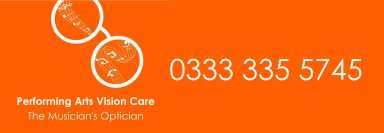
Practical Eye Health Tips for Performers
Look After Your Eyes—They’re Your Lifelong Instrument
As performers, our eyes are our lifeline on stage, in rehearsal, and behind the scenes. Whether you’re reading sheet music, following choreography, or managing stage cues, around 80% of the information reaching your brain is visual. That makes eye health absolutely essential—not just for performance, but for your independence and confidence as an artist.
Drawing from our specialist workshops, here are practical, evidence-based tips to help you keep your vision in top shape:
How do I care for my eyes?
1. Build a Performer’s Eye Health Routine
- Wash hands before touching your eyes or lenses to prevent infections.
- Remove makeup thoroughly before bed to avoid irritation or blocked glands.
- Clean glasses and cases regularly—dust and grime can cause discomfort and even infections.
- Stay hydrated—aim for at least 6–8 glasses of water a day to support tear production and overall eye health.
- Wear sunglasses with 100% UVA and UVB protection whenever outdoors, even on cloudy days.
2. Eat for Your Eyes: Nutrition Essentials
Your eyes work hard—fuel them with the right foods:
- Omega-3 fatty acids: Found in oily fish like tuna, salmon, and mackerel, these support tear production and help combat dry eye.
- Dark leafy greens: Spinach, kale, and broccoli are rich in lutein and zeaxanthin, antioxidants that protect against light damage.
- Colourful veg & fruit: Peppers, carrots, sweet potatoes, and berries all contribute to healthy retinal function.
- Nuts and seeds: Almonds, walnuts, and flaxseed are great for overall eye wellness.
3. Don’t Skip Your Eye Tests
- Annual or biennial eye exams are a must for performers, even if you think your vision is fine. Subtle changes can creep in unnoticed, especially with stage lighting and long rehearsal hours.
- Don’t ignore anything unusual—if your vision feels different, you notice persistent dryness, flashes, floaters, or discomfort, get it checked out promptly. Early intervention can be career-saving.
4. Rest and Recovery: The 20-20-20 Rule
Long rehearsals and screen-heavy work can tire your eyes. Try:
- Every 20 minutes, look at something 20 feet away for 20 seconds.
- Blink consciously—performance stress and concentration can reduce blink rate, leading to dryness.
- Schedule regular breaks during practice, reading, or tech work to prevent visual fatigue.
5. Maintain a Healthy Environment
- Control dust and allergens in practice spaces and backstage areas—these can trigger or worsen dry eye.
- Use a humidifier if the air is dry, especially in heated or air-conditioned venues.
- Avoid direct air flow from fans or vents towards your face.
- Stay smoke-free—smoke is a major irritant for the eyes.
6. Dry Eye Awareness
Performers are especially prone to dry eye—stage lights, air conditioning, and intense concentration all contribute. Signs include gritty, itchy, or watery eyes. Simple steps help:
- Use preservative-free lubricating drops if needed.
- Wear wraparound glasses when moving props or in dusty environments.
- Discuss persistent symptoms with your specialist optician—there are tailored solutions available.
©Copyright. All rights reserved.
We need your consent to load the translations
We use a third-party service to translate the website content that may collect data about your activity. Please review the details in the privacy policy and accept the service to view the translations.
